Employment law is complex, and keeping up with changes is critical for employers and HR teams. In our recent webinar, employment law expert Adrian Twomey joined our very own Mary Cullen, to explore four pivotal cases, unpacking the challenges faced by employers and the lessons they teach. This blog recaps those cases, highlighting key takeaways and practical advice for HR teams and employers.
If you missed the session, fear not – the entire session, including full advice and links to the cases, is available to watch back on demand here!
Event Summary
Case 1: Heineken Ireland and Keith Hackett
The Story: Keith Hackett, an employee of Heineken Ireland, was accused of bullying and harassment. A barrister-led investigation found that certain behaviours occurred but stopped short of ruling whether they constituted bullying. Despite this, Heineken dismissed Mr. Hackett for gross misconduct. The WRC awarded him €29,000, ruling that the company’s dignity at work policy was not adhered to, as it required the investigator to determine whether bullying had occurred.
The Outcome: Procedural misalignment led to the dismissal being deemed unfair.
Key Takeaway:
- Align Policies with Practice: Regularly review and update policies to reflect current legal standards. Ensure that investigation terms of reference match what your policy requires.
- Investigator’s Role: Be clear about whether investigators are fact-finders or decision-makers. Inconsistent approaches can undermine an otherwise strong case.
- Cultural Awareness: Workplace “banter” may be misinterpreted, leading to disputes. Conduct regular training to clarify what constitutes acceptable behaviour.
Case 2: Musgrave Operating Partners and Katerina Leszczynska
The Story: When Katerina Leszczynska claimed statutory sick pay under the Sick Leave Act 2022, her employer argued their company sick pay scheme, which provided eight weeks of paid leave (after a three-day waiting period), was more favourable overall. The WRC agreed, dismissing her claim.
The Outcome: Employers can rely on more generous policies to override statutory entitlements, provided they are clearly communicated.
Key Takeaway:
- Communicate Clearly: Ensure employees understand how company policies operate compared to statutory entitlements. FAQs and staff information sessions can help clarify differences.
- Anticipate Employee Concerns: A perceived unfairness in specific situations (like a short absence) may arise even with favourable policies. Regularly remind employees of their benefits.
- Stay Proactive: As legislation evolves, audit your policies to confirm compliance while retaining competitiveness.
Case 3: Remote Work Policy Dispute at Centric Mental Health
The Story: After agreeing to full-time remote work, an employee’s terms were later amended to require one office day per month. The WRC upheld the employer’s decision, noting the company had a contractual clause allowing such changes, and the process followed was reasonable.
The Outcome: The WRC ruled that process, not fairness, was its jurisdiction under the Work-Life Balance and Miscellaneous Provisions Act 2023.
Key Takeaway:
- Balance Clarity and Flexibility: Contracts should include well-drafted clauses to allow for reasonable changes while setting clear expectations.
- Engage with Employees: Discuss changes thoroughly before implementation. Consultation fosters goodwill and mitigates disputes.
- Beyond Compliance: A legally sound decision may still alienate employees. Craft internal communications that address practical and emotional concerns, like the impact on childcare or commute costs.
Case 4: Southwest Doctors on Call and Karen Doherty
The Story: Karen Doherty, a part-time receptionist, was dismissed for alleged performance issues without proper warnings or fair procedures. The WRC found severe procedural failings, awarding her over a year’s pay.
The Outcome: The dismissal was deemed unfair due to the employer’s lack of documentation, unclear allegations, and absence of disciplinary procedures.
Key Takeaway:
- Stick to the Basics: Always provide clear allegations, allow employees a chance to respond, and follow a documented disciplinary procedure.
- Proportionality Matters: Avoid jumping straight to dismissal without exploring less severe steps like verbal or written warnings.
- Build a Strong Paper Trail: Document every stage of the process to protect your organisation and demonstrate fairness.
Connecting The Dots: Overarching Themes and Takeaways
- Policy Reviews Are Essential: Outdated or poorly aligned policies expose organisations to unnecessary risks. Conduct annual reviews to ensure compliance and relevance.
- Communication Builds Trust: From policy rollouts to individual performance concerns, clear and consistent messaging fosters understanding and reduces disputes.
- Follow the Process: Procedural missteps often cost employers more than the original dispute. Ensure investigations, disciplinary actions, and contract changes are methodical and compliant.
- Invest in Training: Equip managers with the skills to navigate complex situations, from investigations to implementing new policies.
For full, in-depth, practical advice, and links to all of the discussed cases, make sure to view the full webinar recording, right here!
Staying ahead of employment law challenges doesn’t have to be daunting. Whether you need help revising policies, conducting investigations, or navigating disputes, we’re here to support you.
Our commitment to quality, transparency, and client satisfaction sets us apart from other providers.
With Insight HR, you’ll receive dedicated support from our experienced consultants, with real support and real solutions, every time.
Contact us today for a no-fee, no-commitment chat. We’re here to help!


